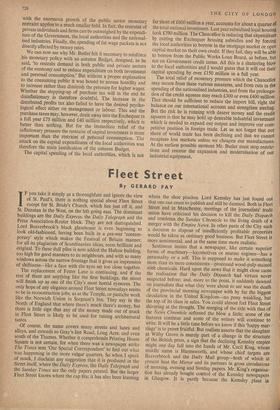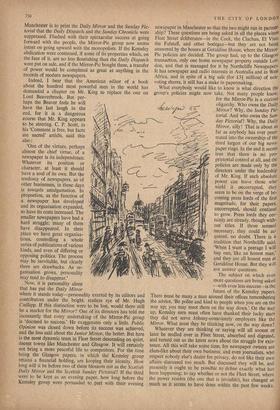'Fleet Street
By GERARD FAY
IF you take it simply as a thoroughfare and ignore the view of St. Paul's, there is nothing special about Fleet Street except for St. Bride's Church, which lies just off it, and St. Dunstan in the West, on the left going east. The dominant buildings are the Daily Express, the Daily Telegraph and the Press Association-Reuter block. They are not distinguished. Lord Beaverbrook's black glasshouse is even beginning to look old-fashioned, having been built in a pre-war `contem- porary' style which makes the Festival of Britain manner, for all its plagiarism of Scandinavian ideas, seem brilliant and original. To these dull piles is now added the Hulton building, too high for good manners to its neighbours, and with so many windows across the narrow frontage that it gives an impression of shiftiness—like a face with the eyes set too close together.
The replacement of Fetter Lane is continuing, and if the rest of them are anything like the first buildings, the street will finish up as one Of the City's most horrid eyesores. The only hope of any elegance around Fleet Street nowadays seems to be in reconstruction jobs, as at the Temple, or pastiche work like the Norwich Union in Sergeant's Inn. They say in the North of England that where there's muck there's money, but there is little sign that any of the money made out of muck in Fleet Street is likely to be used for raising architectural tastes.
Of course, the name covers many streets and lanes and alleys, and extends to Gray's Inn Road, Long Acre, and even south of the Thames. Whether it comprehends Printing House Square is not certain, for when there was a newspaper strike The Times sent 'Our Special Correspondent' to find out what was happening in the more vulgar quarters. So when I speak of muck, I disclaim any suggestion that it, is produced in the Street itself, where the Daily Express, the Daily Telegraph and the Sunday Times are the only papers printed. But the larger Fleet Street knows where the cap fits; it has also been learning where the shoe pinches. Lord Kemsley has just found out that one can cease to publish and still be damned. Both in Fleet Street and in Manchester, meetings of the journalists' trade union have criticised his decision to kill the Daily Dispatch and condemn the Sunday Chronicle to the living death of a merger with the Empire News. In other parts of the City such a decision to dispose of insufficiently profitable properties would be taken as ordinary good business. But Fleet Street is more sentimental, and at the same time more realistic.
Sentiment insists that a newspaper, like certain superior forms of machinery—locomotives or marine engines—has a personality or a self. This is supposed to make it something more than its mere constituents—processed wood-pulp stained with chemicals. Hard upon the news that it might, close came the realisation that the Daily Dispatch had virtues never suspected before; and. more to the point, it suddenly dawned on journalists that what they were about to see was the death of the provincial morning newspaper with by far the biggest circulation in the United Kingdom—no puny weakling, but the top of its class in sales. You could almost feel Fleet Street shivering at the thought. The merging of the title with that of the News Chronicle softened the blow a little; some of the features continue and some of the writers will continue to write. It will be a little time before we know if this 'happy mar- riage' is to prove fruitful. But realism asserts that the slaughter at Withy Grove is merely part of a change in the structure of the British press, a sign that the declining Kemsley empire might one day fall into the hands of Mr. Cecil King, whose middle name is Harmsworth, and whose chief targets are Beaverbrook and the Daily Mail group—both of which at present beat the Mirror and its partners in gross circulations of morning, evening and Sunday papers. Mr. King's organisa- tion has already bought control of the Kemsley newspapers in Glasgow. It is partly because the Kemsley plant in Manchester is to print the Daily Mirror and the Sunday Pic- torial that the Daily Dispatch and the Sunday Chronicle were suppressed. Flushed with their spectacular success at going forward with the people, the Mirror-Pic group now seems intent on going upward with the monopolists. If the Kemsley abdication were continued, if some of its properties which, on the face of it, are no less flourishing than the Daily Dispatch were put on sale, and if the Mirror-Pic bought them, a transfer of power would be completed as great as anything in the records of modern newspapers.
`One of the virtues, perhaps almost the chief virtue, of a newspaper is its independence. Whatever its position or character, at least it should have a soul of its own. But the tendency of newspapers. as of other businesses, in these days is towards amalgamation. In proportion, as the function of a newspaper has developed and its organisation expanded, so have its costs increased. The smaller newspapers have had a hard struggle; many of them have disappeared. In their place we have great organisa- tions, controlling a whole series of publications of various kinds, and even of differing or opposing politics. The process may be inevitable, but clearly there are drawbacks. As or- ganisation grows, personality may tend to disappear.'
. Now, it is personality alone that has put the Daily Mirror where it stands today—personality exerted by its editors and contributors under the bright, restless eye of Mr. Hugh Cudlipp. If this distinction were to be lost, would there still be a market for the Mirror? One of its directors has told me incessantly that every undertaking of the Mirror-Pic group is 'doomed to success.' He exaggerates only a little. Public Opinion was closed down before its success was achieved, and the less said about the Junior Mirror, the better. But here is the most dynamic team in Fleet Street descending on quiet, decent towns like Manchester and Glasgow. It will certainly not bring a more peaceful life to competitors. For the time being the Glasgow papers, in which the Kemsley group retains a financial holding, are keeping their identity. How long will it be before two of them blossom out as the Scottish Daily Mirror and the Scottish Sunday Pictorial? If the third were to be kept as an evening paper, how long before the Kemsley group were persuaded to part with their evening newspaper in Manchester so that'the two might run in partner• ship? These questions are being asked in all the places where Fleet Street deliberates—in the Cock, the Clachan, El Vino, the Falstaff, and other bodegas—but they are not being answered by the bosses at Geraldine House, where the Mirror' Pie policies are decided. The group had, up to the Glasgow transaction, only one home newspaper property outside Lon- don, and that is managed for it by Northcliffe Newspapers. It has newspaper and radio interests in Australia and in West Africa, and in spite of a big sale (for E31 million) of non' voting shares, it still has a stake in papermaking.
The subject on which even more questions are being asked —with even less success—is the future of the Kemsley papers. There must be many a wan around their offices remembering the advice, 'Be polite and kind to people when you are on the way up; you may meet them on the way down.' On the way up, Kemsley men must often have thanked their lucky stars they did not serve Johnny-come-lately employers like the Mirror. What must they be thinking now, on the way down?
Whatever they are thinking or saying will all sooner or later be mulled over in Fleet Street, absorbed and digested, and turned out as the latest news about the struggle for exis- tence. All this will take some time, for newspaper owners are clam-like about their own business; and even journalists, 06 respect nobody else's desire for privacy, do not like their own affairs discussed too much. But discussed they will be, and presently it ought to be possible to define exactly what has been happening; to say whether or not the Fleet Street, where the power resides (the one that is invisible), has changed as much as it seems to have done within the past few weeks.



























































 Previous page
Previous page